小学六年级英语总复习资料一
- 格式:doc
- 大小:34.34 KB
- 文档页数:7

小学六年级英语总复习资料精编版最新资料推荐:一、字母1、元音字母:Aa Ee Ii Oo Uu2、大写字母的应用:句子第一个单词的首字母要大写。
人名、国家名、地名、语言等专有名词首字母要大写。
星期、月份、节目的单词首字母要大写。
表示“我”的字母“I”永远要大写。
文章标题除冠词、介词、或连词外,每个单词的首字母一般要大写。
二、冠词不定冠词:a、an定冠词:thea、an的使用取决于其后名词以什么音开头,而不是以什么字母开头。
一般情况下,以元音字母开头的单词前要用不定冠词an。
特指独一无二的事物,前面一般加定冠词the。
the用于乐器名称之前。
三、名词可数名词:表示可以用数目来计算的人、事物和概念的普通名词。
(有单复数形式)不可数名词:表示无法用数目来计算的事物和概念的普通名词。
(只有单数形式)可数名词的复数变化规则:1.一般情况下直接加-s。
(浊辅音和元音后读/z/,清辅音后读/s/)例如:pen(pens)、XXX(teachers)2.以s sh x ch结尾的词,一般情况下加-es。
例如:bus(buses)、box(boxes)、dish(dishes)、peach(peaches)3.以“辅音字母+y”结尾的名词先改y为i,再加-es,es读/z/。
例如:family(families)、cherry(cherries)、factory(factories)、candy(candies),但XXX除外。
4.以f或fe结尾的词,多数变f或fe为v再加-es。
例如:knife(kives)、leaf(leaves)、wolf(wolves)5.以o结尾的词后加-es或-s。
(表示有生命的加es,没有生命的加s)Tomato (tomatoes)。
potato (potatoes)。
hero (heroes)。
and photo (photos) are examples of words that change their XXX。
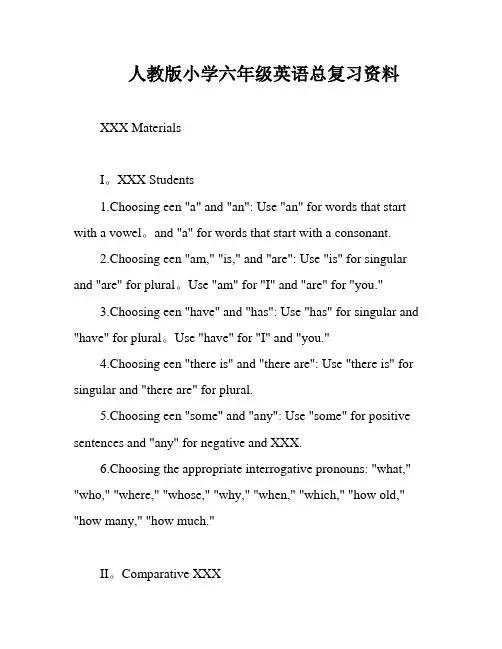
人教版小学六年级英语总复习资料XXX MaterialsI。
XXX Students1.Choosing een "a" and "an": Use "an" for words that start with a vowel。
and "a" for words that start with a consonant.2.Choosing een "am," "is," and "are": Use "is" for singular and "are" for plural。
Use "am" for "I" and "are" for "you."3.Choosing een "have" and "has": Use "has" for singular and "have" for plural。
Use "have" for "I" and "you."4.Choosing een "there is" and "there are": Use "there is" for singular and "there are" for plural.5.Choosing een "some" and "any": Use "some" for positive sentences and "any" for negative and XXX.6.Choosing the appropriate interrogative pronouns: "what," "who," "where," "whose," "why," "when," "which," "how old," "how many," "how much."II。
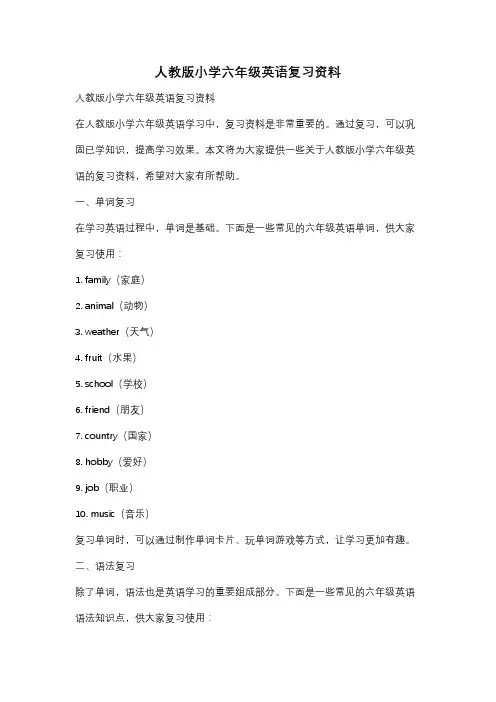
人教版小学六年级英语复习资料人教版小学六年级英语复习资料在人教版小学六年级英语学习中,复习资料是非常重要的。
通过复习,可以巩固已学知识,提高学习效果。
本文将为大家提供一些关于人教版小学六年级英语的复习资料,希望对大家有所帮助。
一、单词复习在学习英语过程中,单词是基础。
下面是一些常见的六年级英语单词,供大家复习使用:1. family(家庭)2. animal(动物)3. weather(天气)4. fruit(水果)5. school(学校)6. friend(朋友)7. country(国家)8. hobby(爱好)9. job(职业)10. music(音乐)复习单词时,可以通过制作单词卡片、玩单词游戏等方式,让学习更加有趣。
二、语法复习除了单词,语法也是英语学习的重要组成部分。
下面是一些常见的六年级英语语法知识点,供大家复习使用:1. 一般现在时:用于描述经常发生的动作或客观事实。
例如:I go to school every day.(我每天去学校。
)2. 一般过去时:用于描述过去发生的动作或状态。
例如:He played basketball yesterday.(他昨天打篮球。
)3. 现在进行时:用于描述正在进行的动作。
例如:They are watching TV now.(他们正在看电视。
)4. 一般将来时:用于描述将来要发生的动作或计划。
例如:I will visit my grandparents next week.(我下周要去看望我的祖父母。
)通过复习这些语法知识点,可以加深对英语语法的理解,提高语言表达能力。
三、阅读理解阅读理解是英语学习中的重要环节。
下面是一篇适合六年级学生阅读的短文,供大家练习阅读理解:Tom is a 12-year-old boy. He lives in a small town. He has a big family. There are six people in his family. They are his parents, his grandparents and his little sister. Tom's father is a doctor and his mother is a teacher. They are very busy. Tom's grandparents are retired. They like playing chess and taking walks in the park. Tom's little sister is only 3 years old. She likes playing with dolls.1. How old is Tom?A. 10 years old.B. 11 years old.C. 12 years old.2. How many people are there in Tom's family?A. 4.B. 5.C. 6.3. What does Tom's father do?A. He is a doctor.B. He is a teacher.C. He is retired.4. What does Tom's little sister like?A. Playing chess.B. Taking walks in the park.C. Playing with dolls.通过阅读理解的练习,可以提高对英语文章的理解能力,培养阅读习惯。
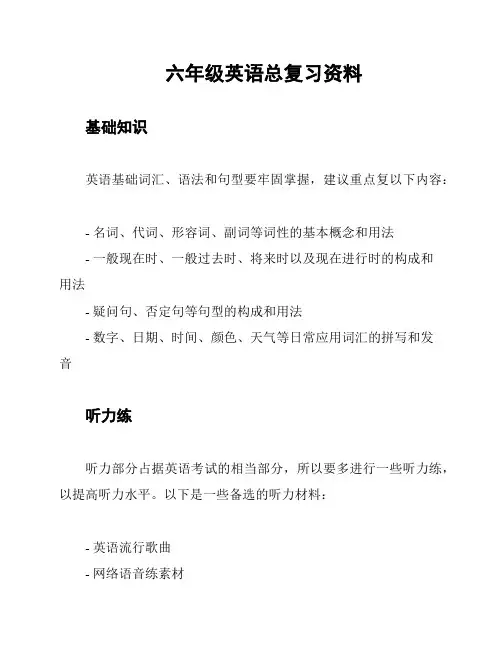
六年级英语总复习资料
基础知识
英语基础词汇、语法和句型要牢固掌握,建议重点复以下内容:
- 名词、代词、形容词、副词等词性的基本概念和用法
- 一般现在时、一般过去时、将来时以及现在进行时的构成和
用法
- 疑问句、否定句等句型的构成和用法
- 数字、日期、时间、颜色、天气等日常应用词汇的拼写和发
音
听力练
听力部分占据英语考试的相当部分,所以要多进行一些听力练,以提高听力水平。
以下是一些备选的听力材料:
- 英语流行歌曲
- 网络语音练素材
- 录音机录制自身朗读的英语材料
口语练
英语口语练是提高英语水平的重要途径,建议多进行一些口语练,同时在口语练中寻求不同的交流场合,以提高英语表达能力。
可以选择以下口语练方式:
- 和外教进行一对一口语练
- 参加英语口语角
- 加入英语社区,在社区中交流和分享研究心得
阅读练
阅读是提高英语理解和阅读能力的重要途径,可以多选择以下练方式:
- 阅读英文书籍,建议选择适合阅读水平的英文原著
- 阅读英文新闻,建议选择有词汇注释的新闻网站
- 阅读英文杂志,建议选择感兴趣的主题材料
写作练
写作是提高英语表达能力和阅读能力的重要途径,可以选择以下练方式:
- 写博客,分享自己的研究心得和经验
- 每日写作练,就一些简单的主题写下自己的想法和感受
- 参加英语写作比赛,切磋提高自己的水平
总结
以上是六年级英语总复习资料的一些建议和练习方法,需要进行有节奏的训练,多角度全方位提高英语水平,从而取得满意的成绩。

小学六年级英语复习资料复习资料(1)一、理解下列疑问词What什么 What time几点 When什么时候 What color 什么颜色Who 谁 whose 谁的 where哪里 what animal 什么动物which哪个 How怎样 how old 多大 how often多久一次how many多少How much多少钱 how long多长 how far 多远二、本册常见的特殊问句1. What should you do When you meet new people?当你遇见陌生人时,应该做什么?2. How should I meet new people? 遇见陌生人应该怎么做?3. What’s your favourite animal?你最喜欢的动物是什么/= Which animal is your favourite?4. How about XX?=What aboutXX? XX怎样?5. How much is it?这个多少钱?6. How long can they live? 他们能活多久?7. Where were you?你在哪儿?8. What were you doing when China got the 2008 Olympics?当中国取得2008年奥运会举办权时,你在干嘛?9. How often do you get a haircut? 你多久理一次发?三、本册常用的一般问句及答案1. Should I hug them? Yes, you should.No you shouldn’t.2. Are your mum and dad (parents) at home?你父母在家吗?Yes,they are. No,they aren’t.3. Can I take a message? Sure.OK. Certainly 当然.4. Do you like this red notebook ? Yes, it is. No, Idon’t.5. Is that a picture of a cheetah? Yes,it is. No,it isn’t.6. Do you think so?你这样认为吗?7. Where you at the library/ Yes, Iwas. No,I wasn’t.四、本册动词过去式和分词.1. 遇见 meet. met . meeting.2. 握(手)shake. shook. shaking3. hug(拥抱) hugged hugging4. say (说) said saying5. do did doing6. don’t didn’t7. take took taking 8. hear(听到) heard hearing9. get. got. getting 10. leave. left leaving (离开)11. put put putting 12. run ran running13. see(看) saw seeing 14. swim(游泳)swam swimming15. read(读)read reading 16. hike hiked hiking (远足)17. make made making 18. watch watched w atching[看]19. think thought thinking[想] 20. wake woke w aking [叫醒]21.ring rang ringing [响] 22. sleep slept sleepi ng [睡]23. cheer【欢呼】cheered cheering 24. teach taught teaching [教]25. buy[买]bought buying 26. fly[飞] flew flyin g27. climb[爬] climbed climbing 28. slide[滑] slided sliding29. study[学习] studied studying 30. learn[学] learned learning31. win[赢] won winging 32. sing[唱] sang singing。

新人教版PEP小学英语六年级总复习资料(全册)New n PEP Primary School English Grade 6 Review MaterialsI。
Antonymsbig --- smallblack --- XXXfree --- busyhot --- XXXsame --- differentcool --- warmtall --- shortlong --- shortyoung --- oldhere --- therebefore --- afternew --- oldII。
Word n1.CountriesChina。
America。
Australia。
Japan。
England。
Canada。
France2.nalitiesChinese。
American。
Australian。
Japanese。
English。
Canadian。
FrenchnguagesChinese。
Japanese。
English。
French4.SubjectsChinese。
Maths。
English。
Art。
Music。
P.E。
History。
Science5.Days of the WeekSunday。
Monday。
XXX。
XXX。
XXX。
Friday。
Saturday6.SeasonsSpring。
Summer。
XXX。
Winter7.MonthsJanuary。
February。
March。
April。
May。
June。
July。
August。
September。
October。
November。
XXX8.FestivalsSpring Festival。
Dragon Boat Festival。
Mid-Autumn Festival。
New Year's Day。
nal Day。
Children's Day。
Easter。
Halloween。
Christmas.1.植物和水果在我们的生活中,植物和水果是不可或缺的。
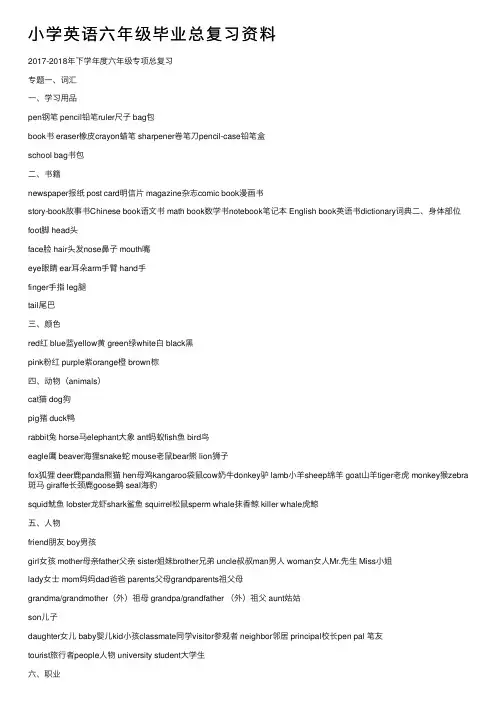
⼩学英语六年级毕业总复习资料2017-2018年下学年度六年级专项总复习专题⼀、词汇⼀、学习⽤品pen钢笔 pencil铅笔ruler尺⼦ bag包book书 eraser橡⽪crayon蜡笔 sharpener卷笔⼑pencil-case铅笔盒school bag书包⼆、书籍newspaper报纸 post card明信⽚ magazine杂志comic book漫画书story-book故事书Chinese book语⽂书 math book数学书notebook笔记本 English book英语书dictionary词典⼆、⾝体部位foot脚 head头face脸 hair头发nose⿐⼦ mouth嘴eye眼睛 ear⽿朵arm⼿臂 hand⼿finger⼿指 leg腿tail尾巴三、颜⾊red红 blue蓝yellow黄 green绿white⽩ black⿊pink粉红 purple紫orange橙 brown棕四、动物(animals)cat猫 dog狗pig猪 duck鸭rabbit兔 horse马elephant⼤象 ant蚂蚁fish鱼 bird鸟eagle鹰 beaver海狸snake蛇 mouse⽼⿏bear熊 lion狮⼦fox狐狸 deer⿅panda熊猫 hen母鸡kangaroo袋⿏cow奶⽜donkey驴 lamb⼩⽺sheep绵⽺ goat⼭⽺tiger⽼虎 monkey猴zebra 斑马 giraffe长颈⿅goose鹅 seal海豹squid鱿鱼 lobster龙虾shark鲨鱼 squirrel松⿏sperm whale抹⾹鲸 killer whale虎鲸五、⼈物friend朋友 boy男孩girl⼥孩 mother母亲father⽗亲 sister姐妹brother兄弟 uncle叔叔man男⼈ woman⼥⼈Mr.先⽣ Miss⼩姐lady⼥⼠ mom妈妈dad爸爸 parents⽗母grandparents祖⽗母grandma/grandmother(外)祖母 grandpa/grandfather (外)祖⽗ aunt姑姑son⼉⼦daughter⼥⼉ baby婴⼉kid⼩孩classmate同学visitor参观者 neighbor邻居 principal校长pen pal 笔友tourist旅⾏者people⼈物 university student⼤学⽣六、职业teacher教师 student学⽣doctor医⽣ nurse护⼠driver司机 farmer农民singer歌唱家 writer作家actor男演员 actress⼥演员 artist 画家engineer⼯程师accountant会计 police警察cleaner清洁⼯ policeman(男)警察 salesperson销售员TV reporter电视台记者baseball player棒球运动员assistant售货员七、交通⼯具bike⾃⾏车 bus公共汽车train⽕车 boat⼩船ship轮船 car⼩汽车taxi出租车 jeep吉普车van⼩货车;⾯包车subway/underground地铁motor cycle摩托车yacht快艇plane/airplane飞机⼋、地点/场所home家 room房间bedroom卧室 bathroom卫⽣间living room起居室kitchen厨房 classroom教室 school学校 park公园 library图书馆 post office邮局police office警察局 hospital医院cinema电影院farm农场bookstore书店zoo动物园 garden花园study书房 playground 操场canteen⾷堂teacher’s office教师办公室library图书馆gym体育馆washroom卫⽣间 art room绘画教室computer room 计算机教室flat公寓music room⾳乐教室TV room 电视机房 company公司theme park主题公园fruit stand⽔果摊 pet shop宠物商店 nature park ⾃然公园factory⼯⼚science museum科学博物馆the Great Wall长城supermarket超市bank银⾏ country国家village乡村city城市 hometown 家乡bus stop公交车站science bookstore科学书店Spring City春城Stone Forest ⽯林九、课程sports体育运动science科学 Chinese 语⽂ Moral Education思想品德课 math数学P.E.体育课 English英语课Social Studies社会课⼗、国家、城市China/PRC中国America/USA美国England/UK英国Canada/CAN加拿⼤Australia澳⼤利亚New York纽约 London伦敦Sydney悉尼Moscow莫斯科⼗⼀、⼤⾃然flower花 grass草tree树 seed种⼦sprout苗 plant植物rose玫瑰 leaf叶⼦tree 树 rain⾬cloud⽩云 vapour⽔蒸⽓sun太阳 stream⼩溪river河流 lake湖泊⼗⼆、星期Monday星期⼀ Tuesday星期⼆ Wednesday星期三Thursday星期四 Friday 星期五 Saturday星期六Sunday星期天weekend周末 week星期、周weekday⼯作⽇⼗三、⽉份Jan. (January) ⼀⽉ Feb.(February)⼆⽉Mar.(March)三⽉April四⽉ May五⽉June六⽉July七⽉Aug.(August)⼋⽉Sept.(September)九⽉Oct. (October) ⼗⽉Nov.(November)⼗⼀⽉Dec.(December)⼗⼆⽉⼗四、季节 spring春summer夏fall/autumn秋winter冬⼗五、⽅位south南north北 east东west西 left左边 right右边straight成直线的⼗六、患病have a fever发烧 hurt 疼痛 have a cold感冒have a toothache⽛疼have a headache头疼have a sore throat喉咙疼have a sore nose⿐⼦疼have an earache⽿朵疼have a stomachache 胃疼、肚⼦疼⼗七、数词基数词one⼀ two⼆three三 four四five五 six六seven七 eight⼋nine九 ten⼗eleven⼗⼀ twelve⼗⼆thirteen⼗三 fourteen⼗四 fifteen⼗五sixteen⼗六 seventeen⼗七eighteen⼗⼋ nineteen⼗九 twenty⼆⼗thirty三⼗forty四⼗ fifty五⼗sixty六⼗seventy七⼗ eighty⼋⼗ninety九⼗ hundred百序数词first第⼀ second第⼆third第三 fourth第四fifth第五 eighth第⼋ninth第九 twelfth第⼗⼆twentieth第⼆⼗thirtieth 第三⼗fortieth第四⼗fiftieth第五⼗sixtieth第六⼗seventieth第七⼗eightieth第⼋⼗ninetieth 第九⼗fifty-sixth第五⼗六⼗⼋、介词in在……⾥ on在……上;在……时候 under 在……下⾯near在……的旁边behind在……后边next to与……相邻over 在……上⾯ in front of 在……前⾯ at 在……点on the left在左边 on the right在右边⼗九、代词⼈称代词I我--me we我们--us you你;你们--you he他--him she她--her it它--it they他(她,它)们--them形容词性物主代词my我的 our 我们的your你的;你们的his他的 her她的its它的their他们的、它们的、她们的名词性物主代词mine 我的……物 yours 你(们)的…….物 his他的……物hers她的……物 its它的……物 theirs他/她/它们的……物⼆⼗、⼼态情绪happy⾼兴的 excited 兴奋的 angry⽣⽓的bored ⽆聊的 sad悲伤的 tired疲劳的⼆⼗⼀、动词过去式watch----watched 看wash---washed洗clean---cleaned打扫visit---visited看望do---did做go---went去read---read读,看learn---learned学习eat---ate吃take---took照climb---climbed爬sing—sang唱歌dance---danced跳舞see---saw看见buy---bought买row—rowed划study---studied学习swim—swam游泳have—had有、吃return—returned归回fly---flew放prepare—prepared准备walk---walked步⾏jump---jumped跳leave---left离开play---played玩relax—relaxed放松get—got到达come—came来run—ran跑⼆⼗⼆、时间this morning(今天上午)this afternoon(今天下午) this evening (今天晚上) every day 每天 nextweek(下周)next weekend下周末 next year明年 next month下个⽉last weekend上个周末last week上周 last year 去年last month上个⽉ next Sunday 下星期天 last Sunday上个星期天⼆⼗三、书籍comic book(漫画书) post card(明信⽚) newspaper(报纸) magazine(杂志)dictionary(字典)Chinese-book(语⽂书) English-book(英语书)math-book(数学书)note-book(笔记本)story-book(故事书) English-book(英语书)⼆⼗四、Hobby(爱好) ride a bike--riding a bike(骑⾃⾏车)dive--diving(跳⽔)play the violin—playing the violin(拉⼩提琴)make kites—making kites(制作风筝)collect stamps—collecting stamps(集邮)⼆⼗五、第三⼈称单数live –lives(居住) teach--teaches(教)go--goes(去)watch--watches(看)read--reads(读,看)⼆⼗六、形容词⽐较级taller更⾼的 shorter更矮的 younger更年轻的older更⽼的 stronger更强壮的 thinner更廋的heavier更重的 longer更长的 bigger更⼤的smaller更⼩的 funnier更有趣的 better更好的⼆⼗七、三餐breakfast早餐 lunch午饭dinner晚饭⼆⼗⼋、疑问副词What(什么) What colour (什么颜⾊) What time(⼏点)What day(问⽇期) What’s the date(问某⽉某⽇)What’s the weather(问天⽓)What is the matter你怎么了?How(怎样) How many (多少) How much(多少钱) How old(⼏岁) Howtall(有多⾼) Howheavy(有多重)How long(有多长) Howbig(多⼤) Howabout(怎么样)When(什么时候) Which(哪⼀个) Where(在哪⾥)Why(为什么) Who谁Whose谁的⼆⼗九、频度副词always(总是) usually(通常) often(经常)sometimes(有时候) never (从来不)三⼗、单位名称millimeter(mm)毫⽶centimeter(cm)厘⽶kilometer(km)千⽶foot英尺kilogram(kg)千克 gram(g)克ton(t/tn)吨meter(m)⽶词汇中的对⽐:1、head hand2、deer beer dear3、tell tail 头⼿⼩⿅啤酒亲爱的告诉尾巴4、two to too5、look out watch out⼆对也⼩⼼⼩⼼6、there they7、How are you Here you are.哪⼉它、他、她们你好吗给你8、read red ride 9、say see 10、writeright读红⾊骑说看见写右边11、want went wait12、baseball basketball football想要去等待棒球篮球⾜球13、night right light might might夜晚右边灯可能可能14、twelve twelfth twenty twentieth ⼗⼆第⼗⼆⼆⼗第⼆⼗15、Miss Mr Mrs 16、come on come from come in想念先⽣⼥⼠加油来⾃进来17、it ’s its 18、no not know它是它的不不是知道19、for four fall 20、police please plane为四落下警⽅请飞机21、garden park 22、boat bought 23、dive drivedriver花园公园船买跳⽔驾驶司机24、put pot 25、、bank bike book放盆银⾏⾃⾏车书26、Saturday Sunday27、Tuesday Thursday星期六星期天星期⼆星期四28、moon noon 29、tonight tomorrow 30、bounce guess pass ⽉亮中午今晚明天反弹猜传递31、actor actress artist 32、work walk week男演员⼥演员画家⼯作步⾏周33、where well will34、buy by bye哪⾥好将要购买乘再见35、north south36、right left write北南右边左边写37、west east best 38、go straight turn leftturn right西东最好直⾛向左转向右转39、must have to 40、but however 41、lake like必须不得不但是然⽽湖泊喜欢42、find look for 43、How are you How old are you 找到寻找你好吗你有⼏岁了44、either too 45、watch catch 46、sweet seep也(否定)也看捉甜的扫地47、doll ball door 48、cake lake lock coke like look娃娃球门蛋糕湖泊锁可乐喜欢看49、duck dog 50、this that 51、these those 鸭⼦狗这个那个这些那些52、no not on 53、parents presents 54、here hearthere 不不是在上⾯⽗母礼物这⼉听见那⼉55、matter事情 meter⽶56、here这⼉hear听见there哪⼉ 57、tree树three三 58、bridge桥 fridge冰箱 59、go skiing去滑雪go ice-skating去滑冰60、lamp台灯 lamb⼩⽺ climb 爬 61、board⿊板 bored烦恼的62、skirt短裙 shirt衬衫63、walkman随⾝听 watermelon 西⽠64、bear熊bird鸟65、sheep绵⽺ ship船 cheap 便宜的 66、washroom洗⼿间bathroom卫⽣间 67、his他的her她的 68、swim游泳 swing荡秋千69、honey蜂蜜 hobby爱好 happy ⾼兴70、potato⼟⾖ tomato西红柿71、clean the room打扫房间clean the bedroom打扫卧室72、work⼯作 walk步⾏ week 周73、watch看 wash洗 catch 捉74、slippers拖鞋 sneakers ⽹球鞋75、jeans⽜仔裤jacket夹克76、pig猪big⼤的77、boy男孩 toy玩具78、boat⼩船 coat外⾐ goat ⼭⽺ 79、body⾝体 baby 婴⼉80、horse马house房⼦81、forest森林fast快的first第⼀82、next week下周next weekend下个周末83、weekend周末 weekday⼯作⽇ week星期、周84、family家庭 farmer农民farm农场 85、uncle叔叔 aunt 姑姑86、soup汤 spoon⼩勺 87、mutton⽺⾁mountain ⼭脉88、pork猪⾁park 公园89、far远的for为、给90、some⼀些same相同的swim游泳91、purple紫⾊的 people⼈们92、angry⽣⽓的 hungry饥饿的93、ill⽣病的ear⽿朵94、then然后 than与......相⽐较95、flu流感flew放96、tip建议 trip 旅⾏97、get up起床 get off下车wake up醒来 98、first第⼀fast 快99、rule规则 ruler尺⼦ 100、A.M.上午 P.M.下午101、rose玫瑰nose⿐⼦nurse护⼠102、funny有趣的 funnier 更有趣的 fun快乐103、feel感觉 seal海豹104、went去 want想要 what 什么105、homework作业housework家务107、may 可以meet 遇见make 制做专题⼆:短语专题三:句型⼀般疑问句:Be动词引导:1、A:Is he……B:Yes,_________No,____________.2、A:Is she……B:Yes,__________No,____________3、A:Is it/this/that……B:Yes,__________No,____________4、A:Are you……B:Yes,___________No,_______ ______5、A:Are they……B:Yes,___________No,_______ _______6、A:Am I……B:Yes,____________No,______ _______ Do引导:1、A:Do you……B:Yes,___________No,_______ __2、A: Do they…….B:Yes,___________No,_________ ___Does引导:1、A: Does she……B: Yes,__________No,__________2、A:Does he…….B:Yes,___________No,____________Did引导:1、A: Did you……B: Yes,__________No,__________2、A: Did he……B: Yes,_________No,_________3、A:Did she……B:Yes,________No,__________4、A:Did they……B:Yes,_________No,_________以Can引导:1、A;Can you……B:Yes,_________No,_________ _2、A:Can he……B:Yes,__________No,________ __3、A:Can she……B:Yes,_________No,_________ _4、A:Can they……B:Yes,________No,__________ _ There Be 句型:1、A:Is there+单数名词……B:Yes,________No_________2、A:Are there+复数名词…… B:Yes,__________No,___________特殊疑问句:How---问交通⽅式、交通⼯具 How old---问年龄 How are you---你好吗 How do you feel---感觉怎么样 How many---问数量How much---问价格 How about---怎么样 How tall---有多⾼ How heavy---有多重 Where---问地点、⽅位 What---事情、动作What colour---问颜⾊ What time---⼏点了 What day---问星期 What ‘s the date---某⽉某⽇ What ’s the weather---问天⽓ What ’s the matter---怎么了 When----什么时候 Which---哪⼀个 Who---谁、谁、谁 Why---为什么(because ) Whose---⼈名’s 六年级上下两册重点句⼦:六年级上册句型1. How do you go to school (你怎样上学)I go by bike.(我乘⾃⾏车去。

小升初英语复习资料一:易错点1. a, an的选择: 元音音素开头的单词用an,辅音音素开头的单词用a. 元音字母为a e i o u2. am , is , are的选择: 单数用is , 复数用are. I 用 am , you 用 are.3. have , has 的选择: 表示某人有某物.单数用has , 复数用have. I ,you 用have .4. there is, there are 的选择:表示某地有某物,某人.单数用there is , 复数用there are.5. some, any 的选择:some用于肯定和请求, any用于否定和疑问.6. 疑问词的选择:what (什么) who (谁) where (哪里) whose (谁的) why(为什么)when(什么时候)which(哪一个)how old (多大) how many (多少)how much(多少钱)二.可数名词的复数1.一般名词复数是在名词后面加上“s”,如map→maps,bag→bags等;2.以s, sh, ch, x等结尾的词加“es”,如bus→buses,watch→watches 等;3.以辅音字母+y结尾的词,变y为i加es,如baby→babies等;以元音字母+y结尾的名词变复数时,直接加s变复数,如boy—boys,monkey→monkeys. 4.以o 结尾的名词变复数时:下列词加es ,Negro—Negro;hero—heroes;potato—potatoes;tomato—tomatoes(黑人英雄爱吃土豆和西红柿)其他加s:photo→photos ,piano→pianos,radio→radios,zoo→zoo s 5.以f或fe结尾的名词变复数时:一般为去掉f, fe 加ves,如:half→halves ,knife→knives ,leaf→leaves,wife→wives ,life→lives,thief→thieves不规则形式:child---children;foot---feet;tooth---teeth;deer--deer;sheep---sheep;man--men;woman—women;mouse—mice;Chinese—Chinese;Japanese—Japanese注意:(too)many+可数名词复数,(too)much+不可数;Some/a lot of/lots of后既可加可数复数也可加不可数名词三.名词所有格名词所有格是名词所有格用来表示所有关系,一般用’s和of来表示名词的所有格,表示“......的”。

小学六年级英语复习资料### 小学六年级英语复习资料#### 一、词汇复习1. 日常用语:- Greetings: Hello, Good morning, Goodbye- Expressions: Please, Thank you, Sorry2. 颜色:- Red, Blue, Green, Yellow, Black, White3. 数字:- 1 to 100, Thousand, Million4. 家庭成员:- Father, Mother, Brother, Sister, Grandfather, Grandmother5. 学校用品:- Pen, Pencil, Book, Notebook, Eraser6. 动物:- Dog, Cat, Elephant, Tiger, Bird7. 食物:- Apple, Banana, Rice, Noodles, Pizza#### 二、语法重点1. 一般现在时:- 描述日常习惯、事实或普遍真理。
2. 现在进行时:- 描述正在进行的动作。
3. 一般过去时:- 描述过去发生的事情。
4. 一般将来时:- 描述将来会发生的事情。
5. 疑问句:- 询问信息,使用疑问词(Who, What, Where, When, Why)。
6. 否定句:- 表达否定,使用助动词(Do/Does/Did not)。
#### 三、句型结构1. 陈述句:- I am a student.- She likes to read books.2. 一般疑问句:- Do you like apples?- Can he play the piano?3. 特殊疑问句:- What is your favorite color?- Where does she live?4. 祈使句:- Please close the door.- Don't forget to do your homework.#### 四、阅读理解- 阅读短文,理解大意,回答相关问题。
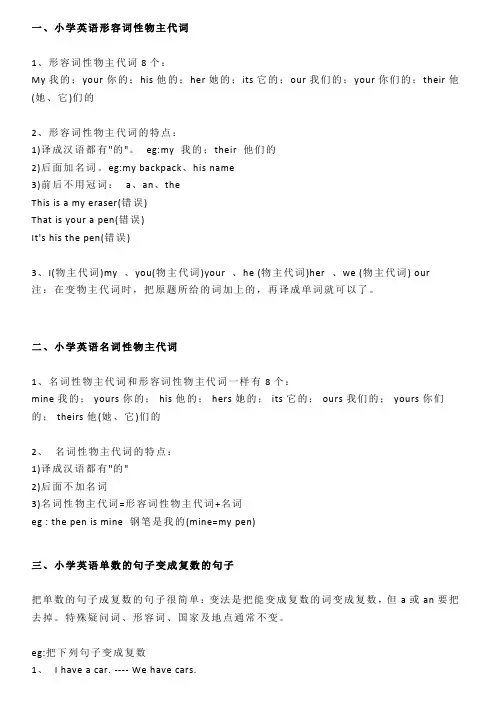
一、小学英语形容词性物主代词1、形容词性物主代词8个:My 我的; your 你的; his 他的; her 她的; its 它的; our 我们的; your 你们的; their 他(她、它)们的2、形容词性物主代词的特点:1)译成汉语都有"的"。
eg:my 我的;their 他们的2)后面加名词。
eg:my backpack、his name3)前后不用冠词:a、an、theThis is a my eraser(错误)That is your a pen(错误)It's his the pen(错误)3、I(物主代词)my 、you(物主代词)your 、he (物主代词)her 、we (物主代词) our注:在变物主代词时,把原题所给的词加上的,再译成单词就可以了。
二、小学英语名词性物主代词1、名词性物主代词和形容词性物主代词一样有8个:mine 我的; yours 你的; his 他的; hers 她的; its 它的; ours 我们的; yours 你们的; theirs 他(她、它)们的2、名词性物主代词的特点:1)译成汉语都有"的"2)后面不加名词3)名词性物主代词=形容词性物主代词+名词eg : the pen is mine 钢笔是我的(mine=my pen)三、小学英语单数的句子变成复数的句子把单数的句子成复数的句子很简单:变法是把能变成复数的词变成复数,但a或an要把去掉。
特殊疑问词、形容词、国家及地点通常不变。
eg:把下列句子变成复数1、I have a car. ---- We have cars.2、He is an American boy. ---- They are American boys.3、It is a car. ---- They are cars.4、This is an eraser. ---- These are erasers.5、That is a backpack. ----- Those are backpacks.6、I'm an English teacher. ------ We are English teachers.7、It's a new shirt. ---- They are new shirts.8、He's a boy. ---- They are boys.9、She's a singer. ------ They are singers.a10、What's this in English? ---- What are these in English?四、小学英语名词的数语法名词有单数和复数两种形式1、名词的单数:表示一个人或一个事物2、名词的复数:表示一个人以上的人或事物名词复数的变化规律如下:1、多数情况下在名词后面加s,s 在清辅音后读【s】2、以s,x,sh,ch为结尾的词在词尾加es, es读作【iz】3、以f ,fe为结尾的词去掉f或fe加ves,ves读作【vz】4、以辅音加y 结尾的词,变y 为ies5、以元音加y 结尾的词,直接加s6、不规则变化man-men;woman-women;policeman-policemen;Policewoman-policewomen 这种情况下a变成e(1)、单复数同形Chinese-Chinese;Japanese-Japanese;sheep -sheep;deer -deer(2)、This 这个;these这些(复数);that那个;those那些(复数);I我;we我们(复数);he他;she她;it它;they他、它、她们(复数);am 、is是are(复数)五、小学英语人称代词主格及宾格人称代词分为主格和宾格,主格和宾格区别:主格和宾格汉语意思相同,但位置不同。
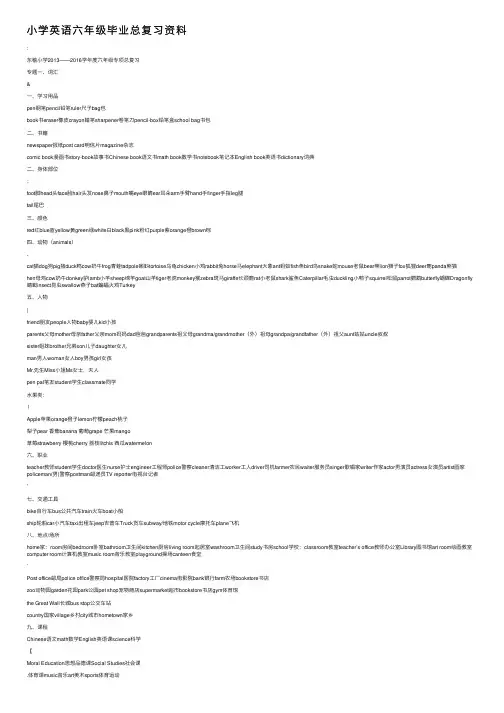
⼩学英语六年级毕业总复习资料:东榆⼩学2013——2016学年度六年级专项总复习专题⼀、词汇&⼀、学习⽤品pen钢笔pencil铅笔ruler尺⼦bag包book书eraser橡⽪crayon蜡笔sharpener卷笔⼑pencil-box铅笔盒school bag书包⼆、书籍newspaper报纸post card明信⽚magazine杂志comic book漫画书story-book故事书Chinese book语⽂书math book数学书notebook笔记本English book英语书dictionary词典⼆、⾝体部位;foot脚head头face脸hair头发nose⿐⼦mouth嘴eye眼睛ear⽿朵arm⼿臂hand⼿finger⼿指leg腿tail尾巴三、颜⾊red红blue蓝yellow黄green绿white⽩black⿊pink粉红purple紫orange橙brown棕四、动物(animals)、cat猫dog狗pig猪duck鸭cow奶⽜frog青蛙tadpole蝌蚪tortoise乌龟chicken⼩鸡rabbit兔horse马elephant⼤象ant蚂蚁fish鱼bird鸟snake蛇mouse⽼⿏bear熊lion狮⼦fox狐狸deer⿅panda熊猫hen母鸡cow奶⽜donkey驴lamb⼩⽺sheep绵⽺goat⼭⽺tiger⽼虎monkey猴zebra斑马giraffe长颈⿅rat⼩⽼⿏shark鲨鱼Caterpillar⽑⾍duckling⼩鸭⼦squirrel松⿏parrot鹦鹉butterfly蝴蝶Dragonfly 蜻蜓insect昆⾍swallow燕⼦bat蝙蝠⽕鸡Turkey五、⼈物|friend朋友people⼈物baby婴⼉kid⼩孩parents⽗母mother母亲father⽗亲mom妈妈dad爸爸grandparents祖⽗母grandma/grandmother(外)祖母grandpa/grandfather(外)祖⽗aunt姑姑uncle叔叔sister姐妹brother兄弟son⼉⼦daughter⼥⼉man男⼈woman⼥⼈boy男孩girl⼥孩Mr.先⽣Miss⼩姐Ms⼥⼠,夫⼈pen pal笔友student学⽣classmate同学⽔果类:!Apple苹果orange橙⼦lemon柠檬peach桃⼦梨⼦pear ⾹蕉banana 葡萄grape 芒果mango草莓strawberry 樱桃cherry 荔枝litchis 西⽠watermelon六、职业teacher教师student学⽣doctor医⽣nurse护⼠engineer⼯程师police警察cleaner清洁⼯worker⼯⼈driver司机farmer农民waiter服务员singer歌唱家writer作家actor男演员actress⼥演员artist画家policeman(男)警察postman邮递员TV reporter电视台记者'七、交通⼯具bike⾃⾏车bus公共汽车train⽕车boat⼩船ship轮船car⼩汽车taxi出租车jeep吉普车Truck货车subway/地铁motor cycle摩托车plane飞机⼋、地点/场所home家:room房间bedroom卧室bathroom卫⽣间kitchen厨房living room起居室washroom卫⽣间study书房school学校:classroom教室teacher’s office教师办公室Library图书馆art room绘画教室computer room计算机教室music room⾳乐教室playground操场canteen⾷堂`Post office邮局police office警察局hospital医院factory⼯⼚cinema电影院bank银⾏farm农场bookstore书店zoo动物园garden花园park公园pet shop宠物商店supermarket超市bookstore书店gym体育馆the Great Wall长城bus stop公交车站country国家village乡村city城市hometown家乡九、课程Chinese语⽂math数学English英语课science科学【Moral Education思想品德课Social Studies社会课.体育课music⾳乐art美术sports体育运动⼗、国家、城市China/PRC中国America/USA美国England/UK英国Canada/CAN加拿⼤Australia澳⼤利亚New York纽约London伦敦Sydney悉尼New Zealand 新西兰France 法国Paris 巴黎Hong Kong⾹港Japan ⽇本⼗⼀、⼤⾃然~flower花grass草tree树seed种⼦plant植物rose玫瑰leaf叶⼦rain⾬cloud⽩云sun太阳wind风snow雪stream⼩溪river河流lake湖泊star星星moon⽉亮⼗⼆、星期Mon. =Monday星期⼀Tues.= Tuesday星期⼆Wed.=Wednesday 星期三Thur.=Thursday星期四Fri.= Friday星期五Sat.=Saturday星期六Sun.=Sunday星期天weekend周末week星期、周weekday⼯作⽇⼗三、⽉份;Jan. (January) ⼀⽉Feb.(February)⼆⽉Mar.(March)三⽉April四⽉May五⽉June六⽉July七⽉Aug.(August)⼋⽉Sept.(September)九⽉Oct. (October) ⼗⽉Nov.(November)⼗⼀⽉Dec.(December)⼗⼆⽉⼗四、季节spring春summer夏fall/autumn秋winter冬⼗五、⽅位south南north北east东west西left左边right右边straight成直线的;⼗六、患病have a fever发烧have a cold感冒have a cough咳嗽have a toothache⽛疼have a headache头疼have a stomachache 胃疼、肚⼦疼ill⽣病⼗七、数词:基数词one⼀two⼆three三four四;five五six六seven七eight⼋nine九ten⼗eleven⼗⼀twelve⼗⼆thirteen⼗三fourteen⼗四fifteen⼗五sixteen⼗六seventeen⼗七eighteen⼗⼋nineteen⼗九twenty⼆⼗thirty三⼗forty四⼗fifty五⼗sixty六⼗seventy七⼗eighty⼋⼗ninety九⼗hundred百序数词first第⼀second第⼆third第三fourth第四fifth第五eighth第⼋ninth第九twelfth第⼗⼆;twentieth第⼆⼗thirtieth第三⼗fortieth第四⼗fiftieth第五⼗sixtieth第六⼗seventieth第七⼗eightieth第⼋⼗ninetieth第九⼗fifty-sixth第五⼗六⼗⼋、⽅位介词in在……⾥on在……上;在……时候under在……下⾯near在……的旁边behind在……后边next to与……相邻over在……上⾯in front of在……前⾯at 在……点on the left在左边on the right在右边⼆⼗、⼼态情绪happy⾼兴的excited兴奋的angry⽣⽓的bored ⽆聊的sad悲伤的tired疲劳的;⼆⼗⼀、动词过去式watch----watched 看wash---washed洗clean---cleaned打扫visit---visited看望do---did做go---went去read---read读,看learn---learned学习eat---ate吃take---took照climb---climbed爬sing—sang唱歌dance---danced跳舞see---saw看见buy---bought买row—rowed划study---studied学习swim—swam游泳"have—had有、吃return—returned归回fly---flew放prepare—prepared准备walk---walked步⾏jump---jumped跳leave---left离开play---played玩relax—relaxed放松get—got到达come—came来run—ran跑⼆⼗⼆、时间表⼀般现在时:this morning(今天上午) this afternoon(今天下午)this evening (今天晚上) every day 每天表将来的:next week(下周) next weekend下周末next year明年next month下个⽉next Sunday下星期天%表过去的:last weekend上个周末last week上周last year去年last month上个⽉last Sunday上个星期天three days ago三天前⼆⼗三、书籍comic book(漫画书) post card(明信⽚) newspaper(报纸) magazine(杂志)dictionary(字典)Chinese-book(语⽂书) English-book(英语书) math-book(数学书)note-book(笔记本) story-book(故事书) English-book(英语书)⼆⼗四、Hobby(爱好)ride a bike--riding a bike(骑⾃⾏车) go swimming-- going swimming 去游泳play the violin—playing the violin(拉⼩提琴)Fly a kite-flying a kite放风筝playing basketball打篮球:⼆⼗五、第三⼈称单数Look-looks(看) feel-feels(感觉起来)smell-smells闻起来Taste-tastes尝起来sound-sounds听起来get-gets(到达,抵达)live –lives(居住) read--reads(读,看)teach--teaches(教) go--goes(去) watch--watches(看)Do-does做have-has有,吃,喝⼆⼗六、形容词⽐较级更⾼的shorter更矮的younger更年轻的older更⽼的stronger更强壮的longer更长的smaller更⼩的,更廋的hotter更热的bigger更⼤的fatter 更胖的更重的funny-funnier更有趣的easy-easier更容易的early-earlier 更早的happy-happier更开⼼的pretty-prettier更漂亮的ugly-uglier更丑的更好的bad-worse更坏的expensive-more expensive更贵的difficult-more difficult更困难的⼆⼗七、三餐breakfast早餐lunch午饭dinner晚饭⼆⼗⼋、疑问副词1.What is it(它是什么)2.%3.What colour is it(什么颜⾊)day is it today(问今天星期⼏)’s the date today(问某⽉某⽇)’s the weather today(问天⽓)is the matter with you你怎么了=What’s wrong with you is it(它怎样) time is it(⼏点)many boys are therein our class(我们班有多少个男⽣) much is the pen( 这只钢笔多少钱)How old are you(你⼏岁了)How about(怎么样)=what about/When does she go to school(她什么时候去上学)Which dress is best(哪⼀条连⾐裙最好)Where are you going(你将要去在哪⾥)Why do you like apples(你为什么喜欢苹果)Who is he他是谁Whose book is it它是谁的书When were you born你什么时候出⽣的|⼆⼗九、频度副词(⽤在⼀般现在时态中)always(总是) usually(通常)often(经常)sometimes(有时候)never(从来不)三⼗、缩写形式:1、. 上午2、.下午3、Entrance ⼊⼝4、Exit 出⼝5、1st第⼀2nd第⼆3rd第三4th第四7、What is=What’s 8、Who is=Who’s 9、can not=can’t 10、do not=don’t 11、does not= does n’t 12、did not=did n’t ¥13、you are=you’re 14、they are=they’re 15、I will=I’ll16、It is=it’s 17、She is=She’s 18、He is=He’s 19、I am=I’m⾷物:1、dumpling 饺⼦2、Zong Zi 粽⼦3、moon-cake ⽉饼4、noodles⾯条5、fruit⽔果单位名称millimeter(mm)毫⽶centimeter(cm)厘⽶kilometer(km)千⽶foot英尺kilogram(kg)千克gram(g)克…ton(t/tn)吨meter(m)⽶There Be 句型:1、A:Is there+单数名词……B:Yes,________No_________2、A:Are there+复数名词……B:Yes,__________No,___________六年级上册句型1. How do you go to school (你怎样上学)I go by bike. (我乘⾃⾏车去。
这篇关于⼩学⽣六年级英语总复习知识点归纳,是⽆忧考特地为⼤家整理的,希望对⼤家有所帮助!1、话题 (1) 字母:(⼤⼩)辨认、书写顺序 : Aa Bb Cc Dd Ee Ff Gg Hh Ii Jj Kk Ll Mm Nn Oo Pp Qq Rr Ss Tt Uu Vv Ww Xx Yy Zz. 元⾳字母:A a , Ee, Ii, Oo, Uu 半元⾳字母: Yy 书写容易错误的字母:E , F , G, M, N, d, i, p, q, x, y. (2) 数字:基数词和序数词的运⽤,如计算、购物等. 基数词: One, two, three, five, six, seven, eight, nine, ten , eleven, twelve, thirteen, fourteen, fifteen… twenty, twenty-one…thirty, forty, fifty… eighty, ninety, one/a hundred , one/a hundred and one… two hundred. 序数词: first , second , third , fourth , fifth, sixth, seventh, eighth, ninth, tenth, eleventh, twelfth… twentieth, twenty-first, twenty-second, twenty-third, twenty-four…thirtieth, fortieth, fiftieth… eightieth, ninetieth… 相关句型: 1) What’s thirty and forty? That comes to seventy. 2) What’s your telephone number? My telephone number is 83555723. 3) What time is it ? It’s half past ten. 4) When do you usually get up ? At six thirty-five. 5) Where do you live? I live at No.48 Renmin Road. 6) How old are you? I’m twelve. 7) How much does it cost? It costs 50 yuan. 8) How many cars have you got? I have got 6 cars. 9) How many birds can you see in the tree? I can see 3. 10) How many dolls are there on the bed? There is one/a doll. 11) How many dolls are there on the bed? There are four dolls. 12) Which floor do you live on? I live on the fifth floor. 13) Excuse me, can you tell me the way to Baiyun hotel? Yes, go down this street, then turn left at the third crossing…. 14) Who’s the fifth girl from the right? She’s my cousin. 注意:数词的应⽤; 不可数名词及它的量的表⽰⽅法;many与much在⽤法上的区别;there is/are与have/has在⽤法上的区别. (3)颜⾊:实物的颜⾊ colours: red, pink, yellow, brown, blue, purple, orange, black, white, grey, dark blue, light blue. 相关句型: 1) What colour is your coat? It’s ... 2) What’s your favourite colour? My favourite colour is … (4)时间:年、季节、⽉、星期、⽇、时刻 year, season( spring, summer, autumn, winter) , month: January, February, March, April, May, June, July, August, September, October, November, December. Week: Sunday, Monday, Tuesday, Wednesday, Thursday, Friday, Saturday. Day: 1st May (the first of May), May 2nd ( May the second) Time: (an) hour, minute, second 10:05 (five minutes past ten, ten o five) 10:10 (ten minutes past ten, ten ten) 10:15 (quarter past ten, ten fifteen) 10:30 (half past ten, ten thirty) 10:45 (quarter to eleven, ten forty-five) 11:00 (eleven o’clock) 相关句型: 1) How old is your mother? She’s thirty-six years old. 2) How many months are there in a year? There are 12. 3) When’s your birthday? My birthday is on 15th January ( the fifteenth of January). 4) When do you get up? I get up at six o’clock. 5) When does spring last? It lasts for 3 months from March to May. 6) What time is it? It’s quarter to nine.。
小学英语毕业考试总复习资料小学六年级英语总复习小学英语毕业考试总复习资料小学六年级英语总复习小学六年级英语毕业考试是小学英语的重要一关,作为一个英语学习者,它也是你英语学习的一次重要检验。
小学六年级英语考试分为听、说、读、写四个方面,每个方面都非常重要。
下面将分别介绍这四个方面的备考指导。
听力听力考试是英语考试的重要组成部分,它反映了你对英语语音、语调、语言难度等的掌握情况以及你是否具有良好的听力习惯。
备考时可以通过听英语磁带或CD,多听一些与自己水平相符的英语对话,注意语言素材的准确性、实用性和有趣性,可以提高自己的英语语感,同时也提高了听力水平。
口语口语是英语考试的重点,也是考察英语语感和语音的重要方面。
备考时可以在日常生活中多讲英语,多模仿英语口音的发音,加强自己的口型训练,可以让自己更自然地流利地讲好英语。
阅读阅读是小学英语中非常重要的一环,也是六年级小学生英语能力的重要考查方面。
六年级英语复习时可以通过大量阅读原版绘本、儿童故事、英文报纸杂志等,了解常用词汇的使用、文章的内容结构,提高自己的阅读能力。
写作写作考察学生的语言表达能力,也是英语考试的重点之一。
备考时可以通过纠正自己经常犯的语言错误,熟记一些常用的语法规则和句型,不断练习作文,提高自己的写作水平。
在写作过程中,要注意写作结构、词汇用法、句子的连贯性等方面。
总之,小学英语毕业考试是一个非常重要的考试,需要学生认真备考。
通过听力、口语、阅读和写作的多方面训练,学生可以提高自己的英语能力,成功通过小学六年级英语毕业考试,为更好地学习英语打下坚实的基础。
小学英语复习资料(一) 一:学生易错词汇 1. a, an的选择: 元音字母开头的单词用an,辅音字母开头的单词用a. 2. am , is , are的选择: 单数用is , 复数用are. I 用 am , you 用 are. 3. have , has 的选择: 表示某人有某物.单数用has , 复数用have. I ,you 用 have . 4. there is, there are 的选择:表示某地有某物,某人.单数用there is , 复数用there are. 5. some, any 的选择:肯定句用some, 疑问句和否定句用any. 6. 疑问词的选择:what (什么) who (谁) where (哪里) whose (谁的) why(为什么)when(什么时候)which(哪一个)how old (多大) how many (多少)how much(多少钱) 二、动词现在分词详解 动词的ing形式的构成规则: ① 一般的直接在后面加上ing , 如doing , going , working , singing , eating ② 以e 结尾的动词,要先去e再加ing ,如having , writing ③ 双写最后一个字母的(此类动词极少)有:running , swimming , sitting , getting
三、:人称代词与物主代词 一、人称代词 人称 单数 复数
宾格 主格 主格宾格 me I weus you you youyou him he sheherthem they it it
第一人称 第二人称 第三人称
四、物主代词 数 人称 类别 单数 复数 第 第三第二一 人称人称 人 称our your their ours yours theirs 我他(她、你们它)们们 的的 的 第一第二 第三人称 人称 人称my your his her its mine yours his hers its 它他她 我的 你的 的 的 的
形容词性物 主代词名词性物主 代词汉语
五、句型专项归类 1.肯定句:是指用肯定的语气来陈述的句子,如:I'm a student. She is a doctor. He works in a hospital. There are four fans in our classroom. He will eat lunch at 12:00. I watched TV yesterday evening. 2,否定句:含有否定词或表示否定意义词的句子,如:I'm not a student. She is not (isn't) a doctor. He does not (doesn't) work in a hospital. There are not (aren't) four fans in our classroom. He will not (won't) eat lunch at 12:00. I did not (didn't) watch TV yesterday evening. be有动词 ot. 否定句主要是在肯定句的基础上加上了否定词:小结 ☆注意☆. 的句子则湜瑯加在be后面,可缩写成isn't,aren't,但am not 一般都分开写.没有动词be的句子则要先在主要动词的前面加上一个助动词(do,does,did),然后在它后面加上 ot,你也可以把它们缩写在一起如don't , doesn't , didn't ).这三个助动词要根据人称和时态来选择,其中摜敯屳只用于一般现在时主语是第三人称单数的情况,而摜摩只用于一般过去时,不论主语是什么人称和数,都用did . 3,一般疑问句:是指询问事实的句子,此类句子必须用yes,或湜屯来回答. 如:Are you a student Yes, I am / No, I'm not. Is she a doctor Yes, she is. / No, she isn't. Does he work in a hospital Yes, he does. / No, he doesn't. Are there four fans in our classroom Yes, there are. / No, there aren't. Are you going to buy a comic book tonight Yes, I am. / No, I am not. (Yes, we are. / No, we aren't.) Will he eat lunch at 12:00 Yes, I will. / No, I will not(won't). Are they swimming Yes, they are. / No, they aren't. ☆注意☆ 小结:一般疑问句是在肯定句的基础上, ①把动词be调到首位,其他照写,末尾标点符号变成问号即可. ②没有动词be的句子则要在句首加上一个助动词(do,does,)再把紧跟在后面的动词变回原形,末尾标点符号变成问号即可. 这三个助动词也要根据人称和时态来选择,其中摜敯屳只用于一般现在时主语是第三人称单数的情况,而摜摩只用于一般过去时,不论主语是什么人称和数,都用did .一般疑问句有个重要的原则就是问和答要一致,即问句里的第一个单词(助动词)和简略答句里的这个词是一致的. 4,特殊疑问句:以特殊疑问词(what , where , who , which , when , whose , why , how等)开头引导的句子.此类句子应该问什么就答什么,不能用yes 測屯来回答.如: What is this It's a computer. What does he do He's a doctor. Where are you going I'm going to Beijing. Who played football with you yesterday afternoon Mike. Which season do you like best Summer. When do you usually get up I usually get up at 6:30. Whose skirt is this It's Amy's. Why do you like spring best Because I can plant trees. How are you I'm fine. / I'm happy. How did you go to Xinjiang I went to Xinjiang by train. ☆其中how又可以和其他一些形容词连用组成特殊疑问词组用来提问,如: how many(多少(数量)), how much(多少(钱)), how tall(多高), how long(多长), how big(多大), how heavy(多重) 例句:How many pencils do you have I have three pencils. How many girls can you see I can see four girls. How many desks are there in your classroom There are 51. ☆小问可结:how many 用来提数名词的数量,主要有以上三种句式搭配, How many + 名词复数 + do you have 你有多少…… How many + 名词复数 + can you see 你能看见多少…… How many + 名词复数 + are there… 有多少……
六、:完全,缩略形式: I'm=I am he's=he is she's=she is they're=they are you're=you are there's=there is they're=they are can't=can not don't=do not doesn't=does not isn't=is not aren't=are not let's=let us won't=will not I'll=I will wasn't=was not 总结:通常情况下,'m即am,'s即is(但 let's=let us), 're即are ,n't即not (但can't=can not) 七、小学英语词汇不完全归类表 学习用品(school things):pen钢笔pencil铅笔 pencil-case铅笔盒 ruler尺子 book书 bag包 comic book漫画书 post card明信片 newspaper报纸 schoolbag书包 eraser橡皮 crayon蜡笔 sharpener卷笔刀 story-book故事书 notebook笔记本 Chinese book语文书 English book英语书 math book数学书 magazine杂志 dictionary词典
人体(body):foot脚 head头 face脸 hair头发 nose鼻子 mouth嘴 eye眼睛 ear耳朵 arm手臂 hand手 finger手指 leg腿 tail尾巴
颜色(colours):red红 blue蓝 yellow黄 green绿 white白 black黑 pink粉红 purple紫orange橙brown棕
动物(animals):cat猫 dog狗 pig猪 duck鸭 rabbit兔 horse马 elephant大象 ant蚂蚁 fish鱼 bird鸟 eagle鹰 beaver海狸 snake蛇 mouse老鼠 squirrel松鼠 kangaroo袋鼠 monkey猴 panda熊猫 bear熊 lion狮子 tiger老虎 fox狐狸 zebra斑马 deer鹿 giraffe长颈鹿 goose鹅 hen母鸡 turkey火鸡 lamb小羊 sheep绵羊 goat山羊 cow奶牛 donkey驴 squid鱿鱼 lobster龙虾 shark鲨鱼seal海豹sperm whale抹香鲸killer whale虎鲸
人物(people):friend朋友 boy男孩 girl女孩 mother母亲 father父亲 sister姐妹 brother兄弟 uncle叔叔;舅舅 man男人 woman女人 Mr.先生 Miss小姐 lady女士;小姐 mom妈妈 dad爸爸 parents父母 grandparents祖父母 grandma/grandmother(外)祖母 grandpa/grandfather(外)祖父 aunt姑姑 cousin堂(表)兄弟;堂(表)姐妹 son儿子 daughter女儿 baby婴儿 kid小孩 classmate同学 queen女王 visitor参观者 neighbour邻居 principal校长 university student大学生 pen pal笔友 tourist旅行者 people人物 robot机器人